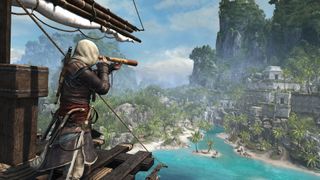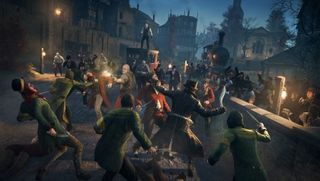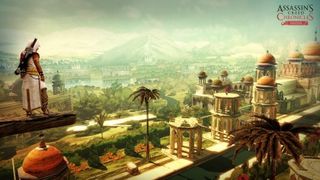Thank the maker there's no new Assassin's Creed this year
The boats and brashness of AC4 proved that a radical new perspective can make all the difference

Spend five minutes in my company (you lucky people) and one thing will become clear: I'm the world's biggest Assassin's Creed apologist. And proud of it too.
I doubt I'm alone in that my love for the series exists in a bizarre duality: one half of me, the rational side perhaps, instinctively knows the series has grown progressively stale and limp since 2010's excellent and criminally-underrated Brotherhood. The other half, the boyish fop who should know better, can't help but get caught up in the excitement of a new AC slinking into view.
A new city. A fresh-faced assassin. Different villains. A brand new soundtrack. Hell, the prospect of another needlessly expensive special edition collecting dust and lusty looks of possession on a shelf in my office. Excite.
I should know better, really – I'm like an addict who mentally disassociates himself from the act and assumes the role of idle spectator, watching as I step across another Ubisoft threshold with hope glittering in my eyes, only to have that hope slowly eroded by a crushing sense of over-familiarity so acute it's practically corporeal.
Breaking the cycle
But, even as an unashamed addict, I'm greeting the latest grist for the rumour mill with relief. The big gaming rumour for the start of the year is that the Assassin's Creed franchise is taking a year off from its hitherto annual cycle, to return in 2017.
While it's only hearsay right now it will probably end up being true, as any rumour or leaked info which takes root in the months after a new Assassin's Creed game arrives almost always proves to be accurate.
And it could be just what the series and its enduring following need.
Get daily insight, inspiration and deals in your inbox
Get the hottest deals available in your inbox plus news, reviews, opinion, analysis and more from the TechRadar team.

Before we go on, I should address Syndicate, because Ubisoft Quebec gave us a flawed masterpiece in its Victorian London outing that hints at potentially great things, while falling into the same clichéd pitfalls the series has found itself in since its earliest years.
Its characters, for the most part, were a joy to accompany. Even if many of them, antagonist Starrick most of all, suffered from a lack of narrative development due to the game's need to hide its big bads behind endless streams of unnecessary lackeys.
I didn't find Evie as revelatory as my fellow writers and gamers did. She was a powerful and self-reliant female character for sure, but ultimately came across as a tad too stoic, and thus a bit of a bore, after 25-plus hours of solid Assassin-ing.
On the other hand, Jacob, Evie's mutton-chopped twin, was a brilliant addition. That was mainly because he pretty much didn't give a toss about anything – much like Edward Kenway in 2013's wonderful Black Flag, but more on that in a sec.
The cast of supporting characters in Syndicate were brilliant, too. Alexander Graham Bell's awkward, over-excited nature was a particularly memorable addition, and the setting of Victorian London practically dripped with the conservative imperialism of pre-1900 Britain.
Austin Wintory's string-based soundtrack made all the difference as well, charming me at every pluck. Ultimately, though, it was all merely a scattering of perfumed roses which failed to hide the putrid stench of the decaying franchise beneath.
Unnecessary over-exposition forced upon me in ever-more-unnecessary conversations that had to be conducted at walking pace. Tailing missions so unchallenging you wonder if the developer really is just trolling us, one eye winking knowingly. The standard Eagle Vision that identifies every danger or benefit through walls and at a distance, robbing any sense of danger or risk. Etc, etc...

Stab like an Egyptian
Syndicate may have been a technically more sound prospect than 2014's Unity was in its first few months of release (as if a game for which we pay in excess of £50 should be praised for working as advertised, come on now people...), but that doesn't hide the fact that it presents all the symptoms of a series in dire need of a) a confident re-approach to the core tenants of its gameplay and b) the simple removal of its brand from the public consciousness.
If the next Assassin's Creed, be it Egypt-set or not, wants to recapture the magic of its golden days, then it need only look three years into the past, to the wonderful enigma that was Black Flag.
It's open-ocean gameplay changed public perceptions of the series (at least up until the release of Unity a year later), and provided the perfect counterpoint to the technical and narrative mess that was Assassin's Creed 3.
Most of all, it provided a new set of gameplay elements that were such fun that it felt a drag to have to acknowledge that yes, once you stopped blowing up Spanish man-o'-wars and looting ancient temples there was a load of Assassin/Templar guff to deal with when you eventually made port.
Assassin's Creed 4 didn't just choose a historical setting and rewrite said history to suit an endless stream of tailing and eavesdropping missions – it embraced a key element of the era and rewrote its own playbook to suit the setting.

The result? A pirate simulator so good I bet it made Sid Meier angrily grind his teeth while weeping uncontrollably with joy.
Even the main protagonist was a breath of fresh air – his playboy attitude and complete disregard for the Templar/Assassin feud made him the perfect antithesis of the series' previously po-faced narrative output.
Back in the hood
But that was then, and this is now. We've since endured two games that returned to the old formula and forgot the series ever had a pair of sea legs.
Now I'm not saying the next instalment of Assassin's Creed need go all boaty again (even though it should at least do a proper pirate spinoff – Black Sails: The Videogame? Hmm? I smell money, Ubi…).I'm saying it needs to build a game that lets the setting and characters sing.
The gameplay should complement the timeline and the story, not hinder it with the scar tissue of a botched surgical intervention.
It says a lot when fans as faithful as myself want the series to go away for a little while. The brand has moved beyond fatigue now. It's become as ubiquitous as FIFA or Madden, and it's a far cry from the revelations-in-the-making that the first two entries in the series were.
It needs time off. It needs to take a look in the mirror and find itself again.
Whatever Ubi does to the Assassin's Creed formula, if the rumours are true and the main series is taking a break until 2017, it will hopefully give the next Ubisoft studio working on the franchise a chance to make the series as utterly essential as it once was.
Most Popular




